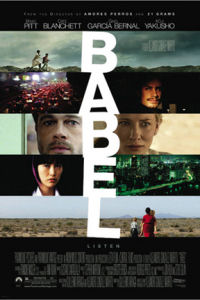Movie Review
‘Babel’: Fist-Clenchingly,
Heart-Wrenchingly Remarkable
By Anna Duning (November 14, 2006)
 ‘Babel’ is
easily one of the most compelling and provocative movies that I have
seen in a long time. The last film that shook me as much as “Babel” was “Crash,’ whose
powerful themes and performances still weaken in comparison. While “Crash” was
stirring, “Babel” was
gripping, so much so that in reacting to the movie’s emotional intensity,
I grasped the sides of my seat nearly the entire time.
‘Babel’ is
easily one of the most compelling and provocative movies that I have
seen in a long time. The last film that shook me as much as “Babel” was “Crash,’ whose
powerful themes and performances still weaken in comparison. While “Crash” was
stirring, “Babel” was
gripping, so much so that in reacting to the movie’s emotional intensity,
I grasped the sides of my seat nearly the entire time.
“Babel,” directed
by the incredibly talented Alejandro Gonzalez Iñàrritu,
hits all the right notes that a good movie should, but exceptionally
forcefully. First, the plot is captivating; it does not lose command
for a second, despite the film’s lengthiness. The four stories span
continents, languages and generations as they chronicle an American
couple (played by Cate Blanchett and Brad Pitt) on a suddenly fatal
vacation; an impoverished Moroccan family whose fate changes with
a single shot of a .227 caliber rifle; a deaf-mute Japanese teenager,
sexually crazed by her inexorable loneliness; and a Mexican nanny
whose decision to attend her son’s wedding alters more than just
her own life.
Interconnected, although some more effectively than
others, the four stories are cause for serious distress in each of
the characters. One of the most compelling occurs when a young Moroccan
boy emotionally surrenders to authorities for firing the shot that
killed the American tourist (Blanchett). Or perhaps it is when the
Amelia, the Mexican nanny, is forced to leave behind the children
whom she has raised and cared for after running into complications
with the border patrol. Or maybe it is when Pitt ... well, they were
all powerful. Nonetheless, Iñàrritu also
weaves in social and political commentary, but in its subtlety, it
seems warranted considering the plot.
The acting certainly does justice
to the plot’s intensity. The film boasts performances by Brad Pitt,
Cate Blanchett and Gael Garcia Bernal,
and while they command their own stories, they do not overrun the
film. Equally talented newcomers, cast from their respective countries
(including Rinko Kikuchi, Adriana Barraza, Boubker Ait El Caid and
Said Tarchani) certainly hold their own in their performances.
Furthermore,
the effectiveness of the “Babel’s” brilliant
art direction and music definitely help carry the film. While the
story of Chieko, the young Japanese girl, is the least related to
the parallel plots (probably one of the movie’s few faults), the
vivid portrayal of a loud Tokyo,
juxtaposed with Chieko’s deafness, definitely lends her story worthiness.
“Babel” is
undeniably intense in terms of its plot, sometimes seeming more like
an action movie than a drama, but its message about the interconnectedness
of humans through relationships and pain is not glaring. Instead,
it allows the viewer to draw his or her own conclusions, especially
from the movie’s ending, which is optimistic for some characters
but uncertain for others.
While seeing “Babel” is
far from a pleasant movie-going experience, it is an invaluable one
in the way the film provokes thought and emotion, even if you have
to remind yourself to breathe.

